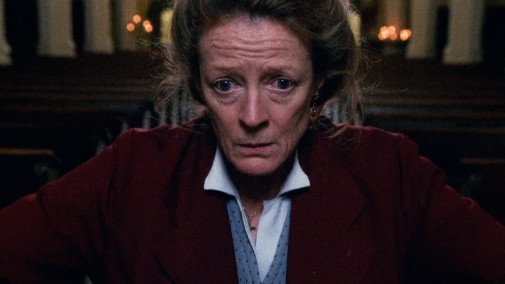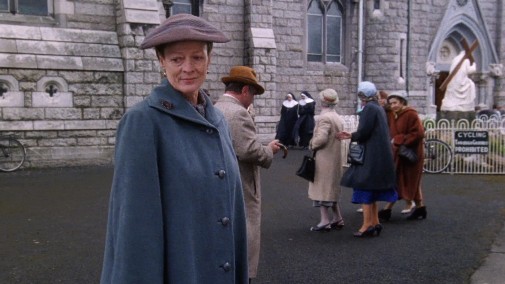
Loneliness hurts. It infects body and mind, eating away at our sanity. We tell ourselves it's a voluntary thing, that it's a choice, but those lies can only work for a time. When self-delusion loses its power, desperation can set in, corroding the spirit and worsening it. Even in crowds, there's a sense of being alone and human touch becomes like bread for a starving man, a morsel feels like the world and its absence gives hunger pains. As time goes by, the will to get out of bed wains and constant bouts of crying can turn to self-hate and disgust. To cure the illness of lonesomeness is hard and some poor folk search for it at the end of a bottle. However, the prophylactic qualities of booze, like self-delusion, have an expiration date. The euphoria of drunkenness gives way to the shame of a hangover and the condition becomes unbearable. It's a chaotic spiral, out of control and ready to destroy our very souls.
The Lonely Passion of Judith Hearne (available on The Criterion Channel) is one of the best films about this subject…

This adaptation of a Brian Moore novel was the last feature directed by Jack Clayton. It tells the story of Judith Hearne, a middle-aged Irish piano teacher who struggles with matters of faith, alcoholism, and crippling loneliness. She spent most of her life chained to the side of a wealthy aunt, caring dutifully for her after the older woman suffered a stroke. By the time the film starts, all her family is dead and the only traces of their existence are the ruby rings adorning Judith's fingers and a picture of the aunt she keeps like a totemic talisman. Aside from it, only a middle-class acquaintance and the patient ear of the local priest give companionship to Judith. Her youth, her life, wasted.

We meet her as she's arriving at a boarding house. At first, we don't know this, but her problems with alcohol have tainted her reputation and made her flee in shame from other housings. Even the few people who are unaware of her vices detect something's wrong since the accomplished pianist is now unable to play like she used to. In a haze of depression and drink, even her favorite pieces by Chopin have slipped away. Hers is a sad state, though Judith Hearne still carries herself with the poise of someone who grew up in plush salons and big respectful houses. That is when she's not falling apart in a drunken stupor, dancing with her aunt's picture like a madwoman intoxicated by her own despondence.

Judith Hearne's loneliness makes her into something of an open wound, vulnerable to a fault and predisposed to attract parasites who want to suck her dry from blood and money. An American relative of the new landlady is one such individual, charming Judith with talks of New York and idle dates to the cinema. In her despair, she gobbles up the faintest attention and pours everything into the idea of romance with this man, falling in love or at least fooling herself into thinking she's in love. When the other shoe drops, it's horrifying to watch and Jack Clayton doesn't spare his audience.

His camera voraciously captures how a person implodes before spitting out the shreds of their torn soul in blasphemous rage. There's some nifty sound work, which makes screaming hysteria into a primordial noise coming from the bowels of the earth. Similarly, the music by Georges Deleure is lustful, almost mocking the characters with its romantic tonalities. Apart from that, The Lonely Passion of Judith Hearne is a simple affair, almost plain. Such aesthetic contention doesn't hurt the picture all that much, making for a perfect blank canvas unto which the actors can paint with bold colors. Among the cast, Maggie Smith is the most accomplished and daring of painters, creating a devastating portrait of shattered humanity. This Irish spinster is no Catherine Sloper - heartbreak doesn't turn Judith into steel, it just breaks her.

For people used to seeing Maggie Smith as a prim lady, delivering bitchy one-liners with unflappable confidence, this performance might be quite the shock. While her aristocratic bearing is still vaguely evident, all the other Smith-isms are absent. In turn, there's a bruising openness to her looks, feverish anguish tainting the brightest of smiles for only when drunk does Judith seem unburdened by the permanent frown marring her expression. The panic upon spilling whiskey is animalistic and the fury at God is stentorious but made sad by the ragged exhaustion irradiating from her tired body. Like Garbo and Fontaine before her, Maggie Smith takes a weepy story and turns the dials to eleven, indulging in melodrama whilst keeping a foot in gritty reality.
With an aborted handshake and a swallowed smile, the smelling of cheap gardenias and the tossing of a crumpled paper, Smith sings rhapsodies of feeling and breaks the heart of the viewer. She's girlish when falling in love and grotesque when falling apart, stony when Judith gives up and appropriately skeptic when a new chance at happiness appears. It's astounding work which would have deserved an Oscar nomination if its year of release wasn't 1987. With Holly Hunter, Cher, Meryl Streep, Sally Kirkland, and Glenn Close, that was an awards season with five fierce competitors, five masterful campaigns and a line-up for the ages. Still, not everything needs to be about the Oscars. The Lonely Passion of Judith Hearne certainly doesn't need the Academy's seal of approval to deserve our attention.
